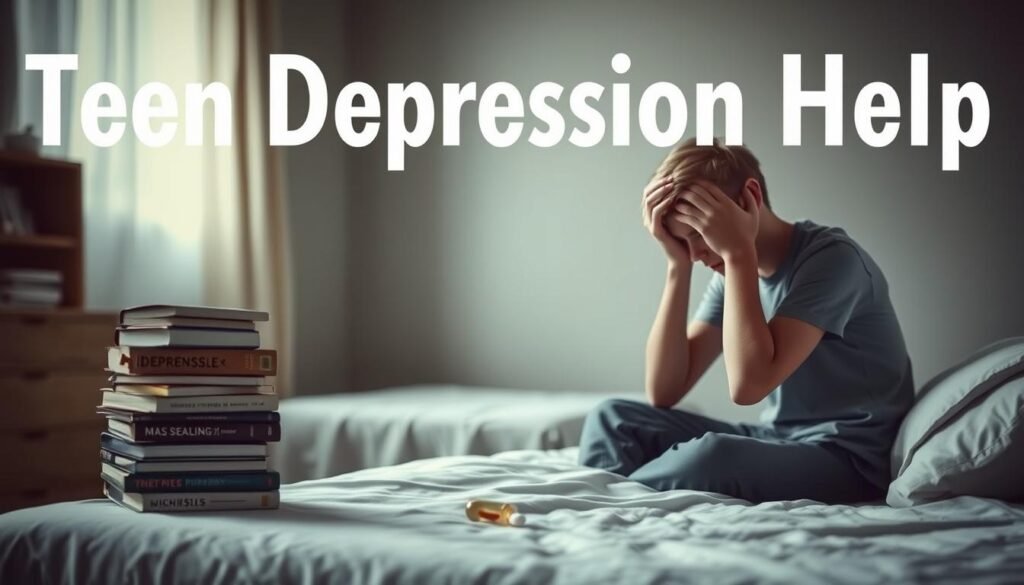Are we doing enough for the emotional well-being of our young ones? Modern life’s pressures are growing, making it crucial to focus on the mental wellness of kids and teens.
The youth mental health issue is huge. We need good support plans for schools and communities.
Let’s look at the main problems and possible fixes. This way, we can help young people do well.
Key Takeaways
- Understanding the importance of early intervention in youth mental health.
- Recognizing the role of child mental wellness programs in schools.
- Identifying effective support strategies for teenagers.
- The impact of community-based initiatives on mental wellness.
- The need for a collaborative approach to addressing youth mental health challenges.
Understanding Youth Mental Health Challenges
It’s key to grasp the complexities of youth mental health to create effective support plans. Youth mental health issues cover a broad spectrum. These can deeply affect a young person’s growth, relationships, and overall happiness.
Key Statistics and Trends
Mental health problems among the young are more common than many realize. Studies show that about 1 in 5 kids and teens face a mental health disorder yearly. Anxiety and depression top the list, with anxiety hitting around 31.9% of teens.
| Mental Health Issue | Prevalence Among Youth |
|---|---|
| Anxiety Disorders | 31.9% |
| Depressive Disorders | 17.3% |
| Other Mental Health Disorders | 20.5% |
Impact on Daily Life
Mental health issues can deeply affect a young person’s daily life. They can impact school performance, social life, and even physical health. For example, child anxiety might cause kids to avoid school or social events.
Signs and Symptoms to Watch For
Spotting mental health issues early is vital. Look for mood, behavior, or appetite changes. For teen depression help, watch for ongoing sadness, loss of interest, and sleep pattern changes.
- Changes in mood or behavior
- Withdrawal from social activities
- Decline in academic performance
- Changes in appetite or sleep
Common Mental Health Issues in Youth
Mental health issues are common among kids and teens. They face many challenges as they grow up. These challenges can affect their well-being greatly.
Child Anxiety: Causes and Effects
Anxiety is a big issue for kids. It can be caused by school stress, friends, and family. Early help is key to managing anxiety and its effects.
Many things can cause child anxiety. These include genes, environment, and big life changes. Spotting the signs like too much worry or fear is important for support.
Teen Depression: Recognizing the Signs
Depression is a big worry for teens. It shows as sadness, losing interest in things, or changes in eating and sleep. Teen depression can come from genes, hormones, and environment.
It’s important to know the signs of teen depression. These include staying away from friends, doing poorly in school, and feeling hopeless.
Other Mental Health Disorders in Youth
Young people can also face ADHD, eating disorders, and substance abuse. Comprehensive mental health support is needed for these issues.
| Mental Health Issue | Common Signs | Support Strategies |
|---|---|---|
| Anxiety | Excessive worry, fear, avoidance behaviors | Cognitive-behavioral therapy, relaxation techniques |
| Depression | Persistent sadness, loss of interest, changes in appetite/sleep | Psychotherapy, medication, lifestyle changes |
| ADHD | Inattention, hyperactivity, impulsivity | Behavioral therapy, medication, educational support |
It’s crucial to have adolescent counseling services and mental health resources for young people. With the right support, we can help them deal with mental health issues. This way, we can help them grow into healthier, stronger individuals.
The Importance of Early Intervention
Early intervention in youth mental health is very important. Starting treatment early can greatly improve treatment success and the well-being of young people.
Benefits of Early Treatment
Early treatment of mental health issues in youth can lead to better outcomes. It can lessen symptoms, make treatment more effective, and improve life quality. Early help also helps in teaching coping strategies for teenagers, helping them manage their mental health better.
Some key benefits include:
- Reduced symptom severity
- Improved treatment outcomes
- Enhanced quality of life
- Better coping mechanisms
How to Identify When Help is Needed
It can be hard to know when a teenager needs mental health help. Look for signs like mood, behavior, or appetite changes. Keeping open communication is also key, letting teenagers share their feelings and worries.
If you see these signs, it might be time for professional help:
- Persistent feelings of sadness or hopelessness
- Withdrawal from social activities
- Significant changes in appetite or sleep patterns
By knowing these signs and taking action, parents, caregivers, and educators can greatly support young people’s mental health.
Family Dynamics and Mental Health
A supportive family is key for young people’s mental health. How family members interact affects kids and teens’ well-being.
The Role of Parents and Caregivers
Parents and caregivers are crucial for emotional support. They help especially those with anxiety. They create a caring space by understanding their child’s feelings.
Key strategies for parents and caregivers include:
- Being open to talk about mental health
- Validating their child’s feelings
- Encouraging professional help when needed
- Showing healthy ways to cope
Effective Communication Strategies
Good communication is vital in a supportive family. It means listening well, showing empathy, and talking about mental health.
Some effective communication tips include:
- Maintaining eye contact and giving full attention
- Using open-ended questions to get more info
- Avoiding judgmental language or tone
- Reflecting on what is said to show you understand
By using these tips, parents and caregivers can greatly help young people with anxiety.
School’s Role in Supporting Mental Health
Schools are key in helping young minds grow. They are not just for learning but also for supporting mental health. The right environment can help or harm a student’s mental well-being.
Supporting mental health in schools is complex. It involves special programs and the work of school counselors.
Mental Health Programs in Schools
Schools offer mental health programs to help students. These programs teach about mental health and help with specific issues like teen depression treatment options.
“Schools are in a unique position to identify and support students who are struggling with mental health issues.”
Effective mental health programs have several key parts:
- Early identification and intervention for mental health issues
- Education on mental health and wellness
- Access to counseling services
- Strategies for managing stress and anxiety
| Program Component | Description | Benefits |
|---|---|---|
| Early Identification | Training for staff to recognize early signs of mental health issues | Timely intervention, better outcomes |
| Counseling Services | Access to school counselors or therapists | Support for students dealing with mental health challenges |
| Mental Health Education | Incorporating mental health into the curriculum | Promotes understanding, reduces stigma |
The Importance of School Counselors
School counselors are crucial in mental health programs. They offer direct support, identify students needing help, and work with teachers and parents.
Good school counselors can spot mental health issues, like teen depression. They can provide teen depression treatment options or refer students to outside help.
By focusing on mental health, schools help students grow and thrive.
Building Resilience in Young People
Resilience is key for youth mental health. It lets young people bounce back from tough times. It’s about learning to handle stress, hard times, and trauma.
Helping young people become resilient is important. It boosts their mental health and helps them face life’s challenges.
Strategies to Foster Resilience
Building resilience in young people requires several steps. Positive relationships with family, caregivers, and friends are crucial. These connections offer emotional support, guidance, and a feeling of belonging.
Another important strategy is encouraging self-efficacy. This means empowering young people to control their lives, make choices, and solve problems. It builds their confidence and ability to handle tough situations.
| Resilience Strategy | Description | Benefits |
|---|---|---|
| Positive Relationships | Emotional support and guidance from family and peers | Enhanced sense of belonging and emotional well-being |
| Self-Efficacy | Empowering young people to make decisions and solve problems | Increased confidence and ability to cope with adversity |
| Emotional Regulation | Teaching young people to manage their emotions effectively | Better mental health outcomes and reduced stress |
Encouraging Healthy Coping Mechanisms
Healthy ways to deal with stress and hard times are vital. Young people can learn to use physical activity, mindfulness, and creative expression. These activities can lower stress, improve mood, and boost mental health.

By supporting these strategies, we can help young people build resilience. This improves their mental health and well-being.
Resources for Parents and Guardians
It’s key for parents and guardians to know about the resources available to help their kids’ mental health. Helping a child or teen with mental health issues can be tough. But, with the right tools, parents can really help.
Counseling and Therapy Options
Counseling and therapy are crucial for young people facing mental health problems. Child anxiety is a big issue that can be helped by different therapy methods.
Some good counseling and therapy options include:
- Cognitive Behavioral Therapy (CBT)
- Family Therapy
- Individual Therapy
- Group Therapy
Online and Community Resources
There are also online and community resources that offer great support. Adolescent counseling services are now online, making it easier to get help.
| Resource Type | Description | Accessibility |
|---|---|---|
| Online Therapy Platforms | Provide access to licensed therapists via video conferencing | High |
| Support Groups | Community-based groups for parents and guardians | Moderate |
| Mental Health Apps | Mobile apps offering tools and resources for mental health support | High |
Parents and guardians should look into these resources to find the best fit for their child.
Engaging with Your Child’s Mental Health Journey
As a parent or guardian, understanding your child’s mental health is key. It’s not always easy, but it’s crucial for their well-being. By getting involved, you can help them find ways to cope and get the support they need.
Active Listening Techniques
Active listening is a powerful tool for supporting your child’s mental health. It means really listening to what they say and understanding their point of view. This makes them feel heard and understood.
Effective active listening includes eye contact, not interrupting, and asking questions that encourage them to share more. These actions create a safe space for your child to talk about their feelings.
How to Start the Conversation
It can be tough to start talking about mental health, but it’s essential. Pick a private and comfortable spot to talk. Be open about your concerns and let your child know you’re there to support them. Encourage them to use mental health resources for young people.
Using “I” statements helps express your feelings without blaming your child. For instance, saying “I feel worried when I see changes in your behavior” can start a supportive conversation. Be patient and let your child share at their own pace.

Here is a table summarizing some key strategies for engaging with your child’s mental health journey:
| Strategy | Description | Benefits |
|---|---|---|
| Active Listening | Fully concentrate on what your child is saying and respond thoughtfully. | Helps your child feel heard and understood. |
| Open Communication | Create a safe environment where your child feels comfortable discussing their feelings. | Fosters trust and understanding. |
| Seeking Professional Help | Know when to seek teen depression help or other mental health resources for young people. | Provides your child with professional support and guidance. |
The Future of Youth Mental Health Support
Looking ahead, supporting young people’s mental health is a big challenge. It needs a mix of strategies. New ways to help early are emerging.
Emerging Trends in Mental Health Care
New tools for teens are coming, like online help and apps. Schools are starting programs to help kids’ mental health too.
Building a Supportive Community
It’s key to build a supportive community for teens. We need to create a place where they feel safe to ask for help. This includes parents, teachers, doctors, and everyone else.
Together, we can help young people succeed. Programs for anxiety, mental wellness in schools, and treatments for depression are all important. They can really help.



